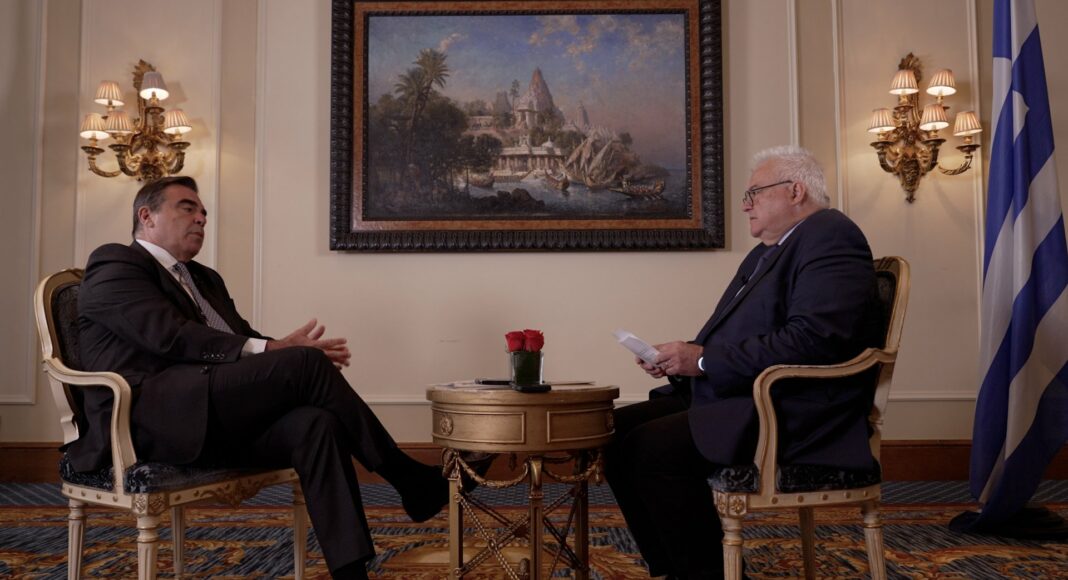Ursula von der Leyen will remain in the Presidency of the European Commission for another five years, the vice-president of the European Commission, Margaritis Schinas, estimated in an interview with “Naftemporiki” TV and Michalis Psilos.
“We will have ‘white smoke’ at the informal dinner of the 27 leaders in Brussels”, Schinas said. “Logically, the European People’s Party will nominate its leading candidate, Ursula von der Leyen as Commission President, the European Socialist Party the former Portuguese Prime Minister, Antonio Costa as President of the European Council and the position of Head of EU Diplomacy in Estonia Prime Minister, Kaja Callas. Well, we will have leading figures from the East and the West, from the North and the South, two women.
On the rise of the far right
Asked to comment on the rise of the far right in the European elections, the vice-president of the Commission explained that it is a result that “we have to interpret at many levels. A simplistic approach would be wrong. The result certainly shows that there are parts of the European population that feel they are left out of the narrative, that they are out of coverage, that they are looking for things that they cannot find, and this is something that should concern us. We need to look at the causes of this concern.”
However, there is also the other reading: “The political forces that want to take Europe forward are more than those that want to either hold it back or destroy it.”
A third reading is that the European elections proved that Europe is slowly emerging as a single public space.
The causes of abstinence
Regarding the causes of the high abstention rates in the European elections – especially in Greece, Schinas noted that in the rest of Europe “the participation rate in the European elections was historically high, at 51%. In 2019, the previous record, we had 49%. So at the European level we cannot say that the abstention was dramatic. Greece didn’t help the European average, it’s true, but that’s part of the first message I was saying earlier that we need to see.
Why didn’t the Greeks vote? Are they unhappy? Do they think that Europe did not help Greece as much as it should have?
There are many factors. I don’t believe that there is hostility towards Europe. Maybe it’s a feeling of indifference. Especially young Europeans, they have the impression that everything they enjoy – Facebook, open borders, cheap tickets – has always been like that, they don’t have the knowledge of the European venture that the older ones have.
There is clearly a part of Greeks that is looking for answers to big issues and believes that Europe has not yet helped them. There is an issue of competitiveness, cohesion, and defense. These will be the demands of the new political cycle. So we have to look to find the causes, but I wouldn’t say that the European participation in the European elections is worrying. The opposite.
We see many young children still living in their parents’ houses, because rents are expensive. It is a European phenomenon, not only a Greek one and it is also the problem of the high cost of life. How do you see these being handled and what have you done so far?
The issue of opportunities for young people is something that we need to work on at many levels. You don’t just press a button and everything changes. In the first place we must exhaust every possibility we have for skills training.
We absolutely need to help businesses open up opportunities for young people at competitive wages, which is not happening at the level the market would justify. Third, we need to look at competition systems.
Is inflation eventually a European or a Greek phenomenon?
There is clearly a European dimension to the issue of high prices which has to do with the pricing policy of large companies selling in the domestic market. This is an issue which will be at the heart of the report that European Union leaders have asked Mario Draghi to present in early July. The European competition authorities must also take an interest in unfair practices, such as the so-called pricing, i.e. how prices change depending on the markets.



